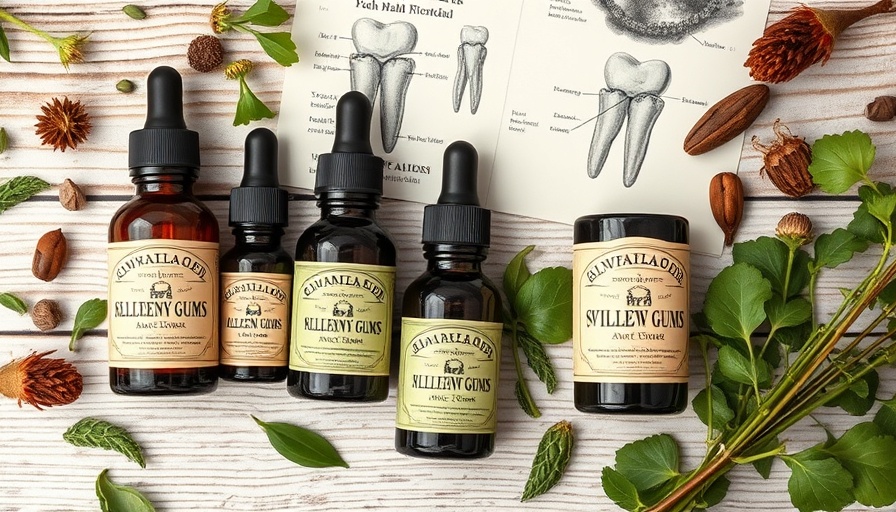
Essential Oils: Nature's Remedies for Swollen Gums
Swollen gums can be uncomfortable and annoying, leading many of us to seek relief far and wide. A growing number of individuals are turning to nature’s remedies, particularly essential oils for swollen gums. These concentrated plant extracts not only promise relief but also support overall oral health in a natural and pleasant way. Alongside my personal experiences, let’s explore why essential oils are an appealing and effective option for treating swollen gums.
Understanding the Benefits of Essential Oils for Oral Health
So, what makes essential oils such an appealing choice for tackling oral health issues? These oils are packed with therapeutic compounds that are often antibacterial and anti-inflammatory. This means they can effectively target the root causes of swelling and discomfort in our gums. For instance, tea tree oil is known for its antiseptic properties, which can help kill harmful bacteria, while clove oil is celebrated for its natural numbing effect.
Top Essential Oils to Alleviate Swollen Gums
Here’s a closer look at some top essential oils that I’ve found particularly effective for swollen gums:
1. Tea Tree Oil
Known as a powerhouse for combating bacteria and reducing inflammation, tea tree oil is typically my first choice for gum issues. When I first tried it, I was amazed at how quickly it alleviated the discomfort. To use, simply mix 1-2 drops of tea tree oil with a tablespoon of coconut oil and swish it in your mouth for 10-15 minutes. This technique, known as oil pulling, can significantly reduce swelling over a few days.
2. Peppermint Oil
Who doesn't love a refreshing burst of mint? Peppermint oil not only provides a cool sensation but also has antimicrobial properties. You can mix 1 drop of peppermint oil with a teaspoon of olive oil to massage onto your gums or even add a drop to your toothpaste for daily freshness. This simple trick ensures you’re benefiting from its properties every day!
3. Clove Oil
Clove oil has been a trusted friend in dental care for ages. With its numbing effects, it is perfect for immediate relief during a gum flare-up. Simply dilute 1 drop of clove oil with 2 teaspoons of a carrier oil and apply it with a cotton swab directly to inflamed areas. The relief can often be felt almost instantly!
4. Lavender Oil
While lavender oil might not be the go-to option for oral health, its anti-inflammatory benefits should not be overlooked. Adding a couple of drops to warm water as a mouth rinse can soothe swollen gums and provide a calming effect.
5. Eucalyptus Oil
Eucalyptus oil can help control inflammation and ward off germs. Just remember, a little goes a long way with eucalyptus, so use it sparingly.
Enhancing Your Oral Health Routine
Incorporating these essential oils can transform your oral health routine into a more natural one. Besides offering relief for swollen gums, using essential oils can promote a healthier mouth environment overall, perhaps even improving oxygenation and ATP production related to gum health.
Long-term Benefits and Wellness
Utilizing essential oils regularly helps support detox and hormone health, keeping inflammation levels down. This commitment doesn’t just alleviate an immediate concern; it enhances your long-term oral wellbeing, allowing for longevity in your dental health practices. Moreover, maintaining an environment conducive to good oral health can positively influence overall vitality and energy levels.
Common Misconceptions about Essential Oils in Dental Care
While many people are eager to try holistic methods, there’s often a misunderstanding that essential oils are a complete replacement for traditional dental care. While they are powerful allies, they should supplement—not replace—routine dental visits and practices. Remember that balance is crucial, and these oils can be a part of a synergy that also includes proper brushing, flossing, and regular dental check-ups.
Practical Tips for Using Essential Oils Effectively
To get the most out of your essential oils, always remember to dilute them with a carrier oil before applying them directly to sensitive areas like your gums. Use only a few drops at a time and opt for high-quality, pure essential oils for the best results. Begin incorporating one oil at a time to gauge individual responses, especially if you have sensitive skin or are prone to allergies.
Ultimately, essential oils can be a valuable addition to your oral care arsenal, promoting both comfort and oral health. So why not give them a try? Your gums might just thank you for it!
If you’re ready to take charge of your gum health, consider integrating essential oils into your dental routine today. Explore the options mentioned above, discover what works best for you, and embrace a natural path to healthy gums!
 Add Row
Add Row  Add
Add 




 Add Row
Add Row  Add
Add 

Write A Comment